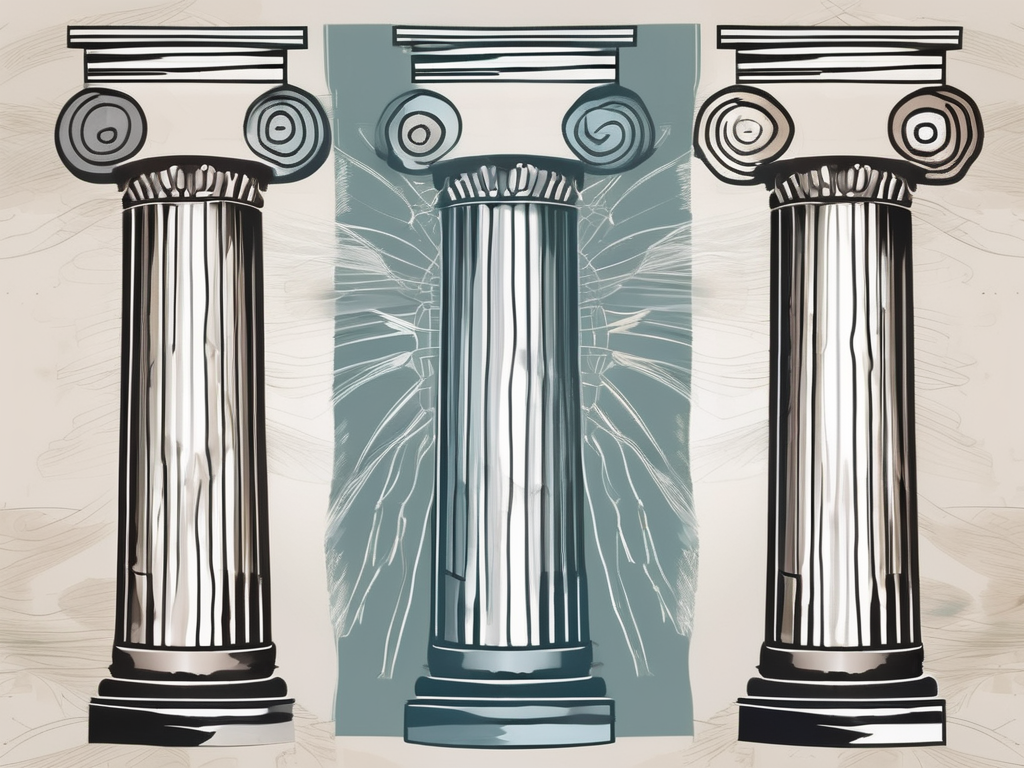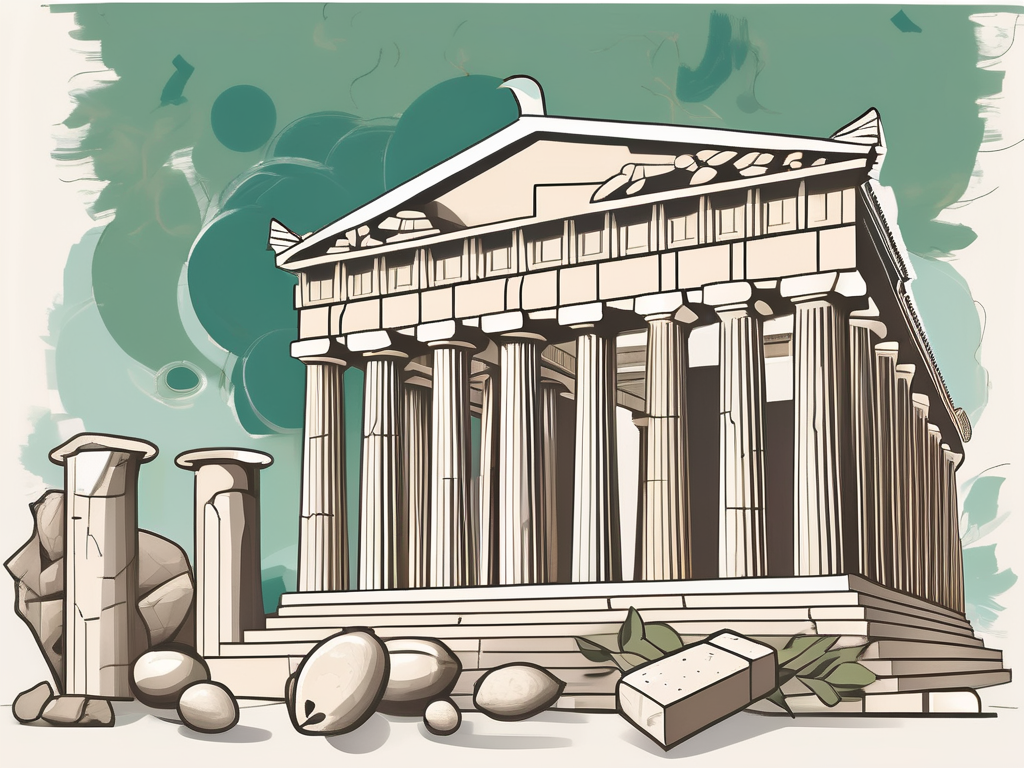Greek philosophers have shaped the way we think and understand the world around us. Their ideas and teachings have had a lasting impact on Western philosophy and have influenced modern thought in various disciplines. In this article, we will delve into the fascinating world of Greek philosophy, exploring its key concepts and examining the lives and works of some of the most influential thinkers of that time.
Understanding the Impact of Greek Philosophy
Before we dive into the specifics, let’s take a moment to understand the significance of Greek philosophy. The birth of Western philosophy can be traced back to ancient Greece, where thinkers began to question the nature of reality, the existence of gods, and the pursuit of knowledge. These philosophical inquiries laid the foundation for intellectual and scientific advancements that we still rely on today.
Greek philosophy also had a profound influence on modern thought. From politics and ethics to metaphysics and epistemology, the ideas put forth by Greek philosophers continue to shape our understanding of the world. By examining their concepts and theories, we can gain valuable insights into the human condition and the nature of reality.
Ancient Greece was a hub of intellectual activity, with philosophers engaging in lively debates and discussions. One of the most famous philosophers of this time was Socrates. Known for his Socratic method, Socrates encouraged critical thinking and questioning of commonly held beliefs. His teachings and approach to philosophy had a lasting impact, inspiring future generations of thinkers to challenge established norms and seek deeper truths.
Another influential figure in Greek philosophy was Plato. A student of Socrates, Plato founded the Academy in Athens, which became a center for philosophical learning. Plato’s writings, such as “The Republic” and “The Symposium,” explored a wide range of topics, including justice, morality, and the nature of love. His ideas on the ideal state and the concept of forms continue to be studied and debated by scholars today.
Aristotle, a student of Plato, made significant contributions to various fields of knowledge, including logic, biology, and metaphysics. His work on logic laid the groundwork for the scientific method, which revolutionized the way we approach scientific inquiry. Aristotle’s writings on ethics and politics also continue to shape our understanding of moral philosophy and governance.
It is important to note that Greek philosophy was not limited to these three prominent figures. There were numerous other philosophers who made valuable contributions to the field. Thinkers like Heraclitus, Parmenides, and Epicurus each had their own unique perspectives on reality, knowledge, and the meaning of life.
The impact of Greek philosophy extends beyond the realm of academia. The principles and ideas put forth by these ancient philosophers have influenced art, literature, and even the development of democratic systems of government. The concept of individual liberty, for example, can be traced back to the ideas of Greek thinkers who emphasized the importance of personal autonomy and self-governance.
Furthermore, the scientific method, which originated from the philosophical inquiries of the Greeks, has revolutionized our understanding of the natural world. By emphasizing observation, experimentation, and logical reasoning, the scientific method has paved the way for countless scientific discoveries and advancements.
In conclusion, Greek philosophy has had a profound and lasting impact on human civilization. The ideas and concepts put forth by ancient Greek thinkers continue to shape our understanding of the world and our place in it. By studying their works, we can gain valuable insights into the human condition, the nature of reality, and the pursuit of knowledge.
Key Concepts of Greek Philosophy
One of the central ideas in Greek philosophy is the concept of virtue. For the ancient Greeks, virtue was not merely about having good moral character; it was about living a life in accordance with reason and fulfilling one’s potential. Philosophers like Aristotle explored the virtues and virtues ethics, arguing that cultivating these qualities leads to a flourishing and meaningful existence.
Aristotle, in particular, delved deep into the virtues and their significance in human life. He identified twelve moral virtues, including courage, temperance, and justice, which he believed were essential for individuals to lead a virtuous life. According to Aristotle, these virtues are not innate but can be developed through practice and habituation. He emphasized the importance of finding the right balance in each virtue, avoiding extremes that could lead to vices.
Another fundamental concept in Greek philosophy is the notion of reality. What is real? What is the nature of existence? These were questions that consumed the minds of philosophers like Plato and Aristotle. Plato, for instance, proposed the theory of Forms, positing that the physical world is a mere reflection of a higher realm of eternal and unchanging ideas.
Plato’s theory of Forms suggests that the objects we perceive in the physical world are imperfect copies of their ideal Forms. For example, a chair we see and use in our daily lives is just a flawed representation of the perfect Form of a chair that exists in the realm of ideas. According to Plato, true knowledge can only be attained by contemplating these Forms, transcending the limitations of the material world.
When it comes to the pursuit of knowledge, Greek philosophers had much to say. Epistemology, the study of knowledge, was a subject of great interest. The likes of Socrates and Plato emphasized the importance of critical thinking, questioning assumptions, and seeking knowledge through dialogue and inquiry.
Socrates, known for his Socratic method, believed that true knowledge is not about having all the answers but rather about recognizing the limits of one’s knowledge and continuously questioning and examining one’s beliefs. He engaged in dialogues with his students, challenging their assumptions and guiding them towards a deeper understanding of the truth.
Plato, a student of Socrates, further expanded on the pursuit of knowledge. He believed that knowledge is not something that can be acquired from external sources but rather something that is already within us. According to Plato, the soul possesses innate knowledge that is awakened through the process of recollection. Through philosophical inquiry and contemplation, one can uncover this hidden knowledge and gain a deeper understanding of the world.
The Pre-Socratic Philosophers
Before diving into the golden age of Greek philosophy, it is essential to explore the ideas of the pre-Socratic philosophers. These early thinkers were the pioneers who laid the groundwork for the philosophical inquiries that would follow.
Thales of Miletus, for example, proposed that water was the fundamental principle from which all things arise. This idea, known as the water principle, marked the first attempt to explain the nature of the world in terms of a single, unifying substance.
Heraclitus, on the other hand, believed in the doctrine of flux – the idea that everything is in a constant state of change. According to Heraclitus, change is the only constant in the universe, and it is through this change that we come to understand the nature of reality.
Pythagoras, known for his mathematical genius, saw the world through a numerical lens. He believed that the universe could be understood through mathematics and that everything could be reduced to numbers and proportions. This idea, known as the mathematical universe, revolutionized our understanding of the physical world.
Another notable pre-Socratic philosopher is Anaximander, who proposed the concept of the “apeiron.” According to Anaximander, the apeiron is an eternal and boundless substance that encompasses all things. It is the source from which everything originates and to which everything returns. This idea challenged the notion of a single, unifying substance and opened up new possibilities for understanding the nature of existence.
Parmenides, on the other hand, argued for the existence of a single, unchanging reality. He believed that change and motion were mere illusions, and that true reality could only be grasped through reason and logic. Parmenides’ ideas sparked intense debates among philosophers of his time and continue to be a subject of philosophical inquiry to this day.
Zeno of Elea, a student of Parmenides, is famous for his paradoxes that challenged our understanding of motion and infinity. His most well-known paradox is the paradox of Achilles and the Tortoise, which raises questions about the nature of space, time, and the infinite divisibility of motion. Zeno’s paradoxes have perplexed philosophers and mathematicians for centuries, pushing the boundaries of human thought and inspiring new avenues of exploration.
Empedocles, a philosopher and poet, proposed the theory of the four elements – earth, air, fire, and water. According to Empedocles, these elements combine and separate to form all things in the universe. He also introduced the concept of love and strife as the driving forces behind the processes of combination and separation. Empedocles’ ideas laid the foundation for later theories of matter and influenced the development of chemistry.
These pre-Socratic philosophers, with their diverse and groundbreaking ideas, set the stage for the rich philosophical tradition that would flourish in ancient Greece. Their inquiries into the nature of reality, the fundamental principles of existence, and the limits of human knowledge continue to shape our understanding of the world and our place in it.
The Golden Age of Greek Philosophy
The golden age of Greek philosophy witnessed the rise of some of the most renowned and influential thinkers in history. Socrates, best known for his Socratic method, believed in the power of questioning and self-reflection to arrive at truth and understanding. His commitment to challenging assumptions and seeking wisdom through dialogue left an indelible mark on Western philosophy.
Plato, a student of Socrates, further developed many of his mentor’s ideas. Plato’s theory of Forms posited that the physical world is a mere imitation of a higher realm of unchanging and perfect ideas. According to Plato, true knowledge and understanding can only be attained through the contemplation of these Forms.
Aristotle, a student of Plato, took a more empirical approach to philosophy. He focused on the study of the natural world and sought to understand the principles that govern it. Aristotle’s metaphysics explored the nature of being and existence, laying the groundwork for scientific inquiry and logical reasoning.
References:
- Graham, D. (2018). The Ancient Greek philosophers: from Thales to Aristotle. Oxford University Press.
- Melchert, N. (2002). The great conversation: a historical introduction to philosophy. McGraw-Hill.
- Freeman, K. (2016). Ancient Greek philosophy: from the presocratics to the Hellenistic philosophers. Wiley-Blackwell.
Through the ideas and teachings of these influential thinkers, Greek philosophy laid the groundwork for Western thought and continues to shape our understanding of the world. Exploring the birth of Western philosophy, the key concepts, and the lives and works of famous Greek philosophers, we can gain valuable insights into the human condition and our place in the universe. So let us embark on this journey of discovery and explore the fascinating world of Greek philosophy.












